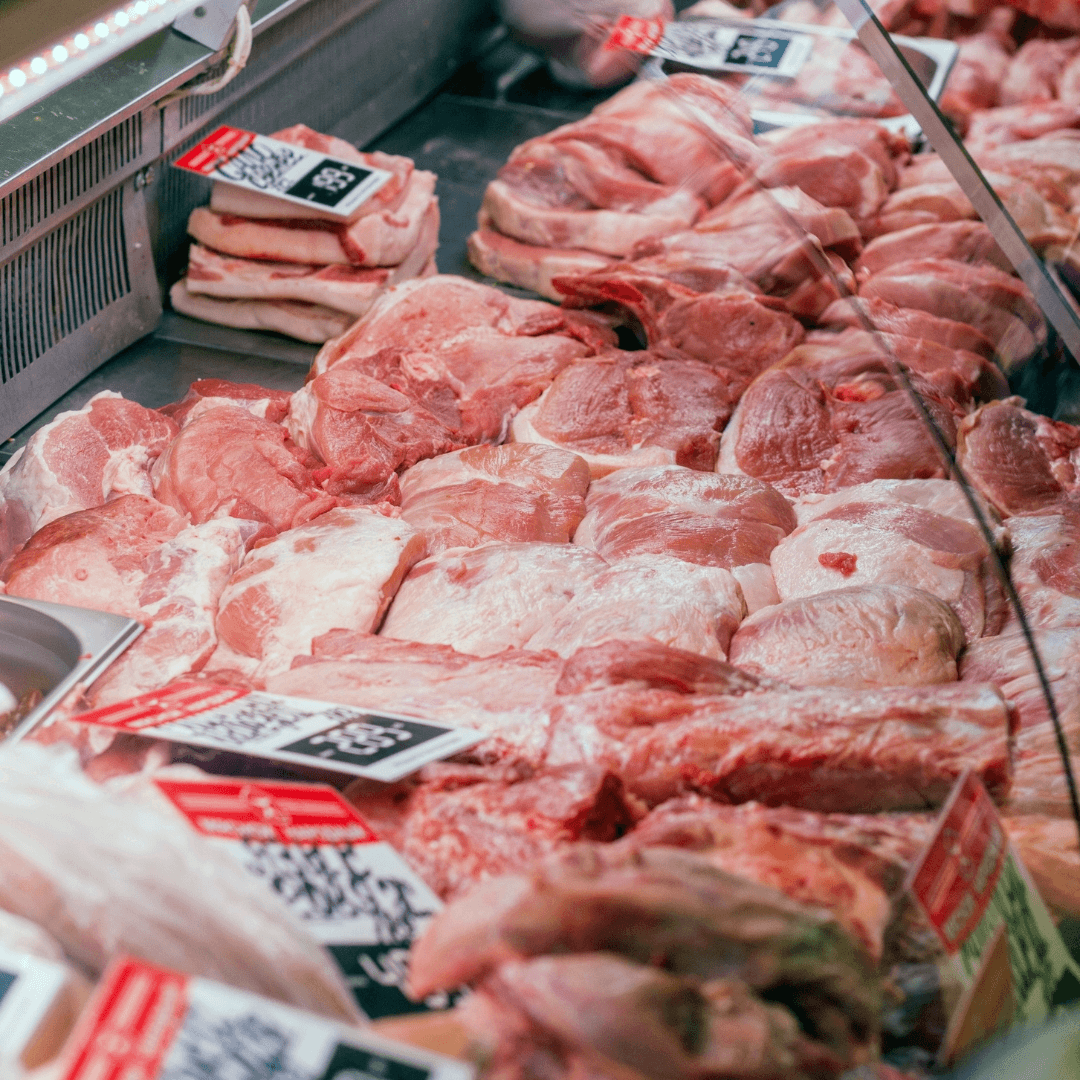Pros And Cons Of Vegan Meat

Pros And Cons Of Vegan Meat
Vegan meat, also known as plant-based or meat alternatives, has become increasingly popular as more people adopt plant-based diets or seek to reduce their meat consumption.
These products are designed to replicate traditional animal-based meat's taste, texture, and appearance without animal ingredients.
As with any food product, there are advantages and disadvantages to consuming vegan meat. This article will examine the benefits and drawbacks of vegan meat so that you can decide whether or not to include these foods in your diet.

What Is Vegan Meat?
Vegan meat, often referred to as plant-based meat or meat substitutes, is a term used to describe food items that mimic the flavour, texture, and look of traditional animal-based meat without containing any animal components.
These products are made entirely from plant sources, such as legumes, grains, soy, and other vegetables, combined with various seasonings and natural flavourings.
The development of vegan meat aims to provide a cruelty-free and more sustainable alternative to conventional meat, often associated with ethical concerns, environmental issues, and potential health risks.
By eliminating the use of animals in the production process, vegan meat addresses the ethical aspects of animal welfare, as no animals are harmed or killed in its creation.
The ingredients used in vegan meat undergo processing and innovative techniques to mimic real meat's fibrous structure and juiciness.
Technologies like extrusion, high-pressure processing, and fermentation help create a meat-like texture and mouthfeel.
Additionally, various plant-based proteins, such as soy protein, pea protein, and wheat gluten, play a crucial role in replicating the protein content found in traditional meat.
Vegan meat comes in various forms, including burgers, sausages, nuggets, meatballs, ground meat, and deli slices, providing consumers a wide range of options.
These products are often seasoned and flavoured to resemble the taste of specific animal meats, allowing individuals to enjoy familiar dishes and flavours without compromising their ethical or dietary choices.
The popularity of vegan meat has grown steadily in recent years, driven by increasing awareness of environmental issues, animal welfare concerns, and a growing demand for plant-based and sustainable food options.
Many people, including vegans, vegetarians, flexitarians, and those looking to reduce their meat consumption, turn to vegan meat as a satisfying and guilt-free alternative to traditional meat dishes.
Overall, vegan meat represents a dynamic and continuously evolving sector of the food industry, offering a promising solution to the challenges posed by conventional meat production while catering to the diverse needs and preferences of consumers seeking more ethical and sustainable food choices.

Pros Of Vegan Meat
In recent years, the rise of veganism and plant-based diets has sparked a remarkable transformation in the food industry, particularly with the emergence of vegan meat.
This innovative alternative to traditional animal-based meat has gained immense popularity among health-conscious consumers and those concerned about the environmental impact of conventional livestock farming.
Vegan meat offers many advantages beyond ethical considerations, making it an enticing option for individuals looking to embrace a more sustainable and compassionate approach to their dietary choices. Here are the advantages of vegan meet:
1. Ethical Considerations
Vegan meat is a compassionate alternative to traditional animal-based meat, as its production does not require the raising, slaughtering, or exploiting animals.
This addresses ethical considerations surrounding animal welfare and aligns with the values of individuals who seek to minimize their contribution to animal suffering.
By choosing vegan meat over conventional meat, consumers can help reduce the demand for factory farming and contribute to a more humane and compassionate food system.
Additionally, supporting plant-based alternatives sends a powerful message to the food industry, encouraging further advancements in sustainable and cruelty-free food production.
Vegan meat offers the satisfaction of enjoying familiar meaty flavours and textures without the ethical burden of consuming animal products.
It makes it an appealing option for those mindful of their impact on animals and who wish to make ethical food choices.

2. Environmental Sustainability
Vegan meat offers significant environmental advantages over conventional meat production.
Plant-based alternatives require less land, water, and energy resources, making them more sustainable and eco-friendly.
On the other hand, livestock farming contributes to deforestation and habitat destruction as forests are cleared to make way for grazing pastures or grow feed crops.
Vegan meat's lower land use helps preserve natural habitats and biodiversity. Additionally, the water footprint of vegan meat is considerably smaller, conserving a vital resource and reducing pressure on water ecosystems.
Moreover, animal agriculture is a significant source of greenhouse gas emissions, contributing to climate change.
Vegan meat emits fewer greenhouse gases, making it a more climate-friendly option. Individuals can actively combat environmental challenges by choosing plant-based alternatives and promoting sustainable practices that safeguard the planet for future generations.
3. Health Benefits
Vegan meat provides several health benefits because it is made of plants. It has less saturated fat, frequently linked to an increased risk of heart disease and other cardiovascular problems.
Eating vegan meat can strengthen their cardiovascular system and lower their chance of developing heart-related disorders.
Additionally, vegan meat is generally cholesterol-free and beneficial for individuals looking to maintain healthy cholesterol levels.
High cholesterol levels can contribute to plaque formation in arteries, potentially leading to heart problems.
Furthermore, plant-based meats are often lower in calories than their animal-based counterparts, making them a suitable option for individuals aiming to manage their weight or maintain a balanced diet.
Embracing vegan meat as part of a balanced and varied plant-based diet can contribute to overall well-being and better health outcomes, aligning with the recommendations of health experts to reduce the consumption of red and processed meats for better long-term health.

4. Allergen-Friendly
Vegan meat offers a welcome alternative for individuals with various allergies or intolerances.
Since it is entirely plant-based, vegan beef is free from common allergens such as dairy, eggs, and gluten, which are prevalent in traditional meat products.
This makes it a safe and suitable option for those needing to avoid these allergens for health reasons.
For individuals with lactose intolerance or a dairy allergy, vegan meat provides a protein-rich alternative without the discomfort or adverse reactions associated with dairy products.
Similarly, people with egg allergies can enjoy plant-based meat options without worrying about exposure to egg proteins.
Moreover, individuals with celiac disease or gluten sensitivity can confidently incorporate vegan meat into their diet, knowing it is gluten-free.
The allergen-friendly nature of vegan meat opens up new culinary possibilities and dietary choices for those with specific dietary restrictions, allowing them to enjoy delicious and nutritious plant-based meals without compromising taste or nutrition.
5. Food Security
With the world's population steadily increasing, ensuring food security becomes a pressing global concern. Vegan meat offers a promising solution to address this challenge.
The traditional meat industry is resource-intensive, requiring vast amounts of land, water, and feed to raise livestock for meat production. In contrast, vegan meat production is generally more sustainable and less resource-intensive.
It requires significantly less land and water, making it a more efficient way to produce protein-rich food.
By shifting towards plant-based alternatives, we can alleviate the strain on natural resources and use land more efficiently to grow crops directly for human consumption.
Additionally, producing vegan meat generates fewer greenhouse gas emissions compared to raising livestock for meat, contributing to mitigating climate change.
This shift towards more sustainable food production practices can help ensure a stable and secure food supply for future generations, particularly as climate change and environmental challenges continue to affect traditional agricultural systems.

6. Reduced Carbon Footprint
Opting for vegan meat can substantially reduce an individual's carbon footprint and contribute to combating climate change.
Methane and nitrous oxide, which have a significantly larger potential for causing global warming than carbon dioxide, are two of the greenhouse gases emitted from livestock production.
By transitioning to plant-based alternatives, the demand for conventional meat decreases, leading to reduced livestock farming and lower emissions.
Vegan meat production emits fewer greenhouse gases and involves fewer processes and resources than raising livestock for meat.
Additionally, cultivating plant-based ingredients for vegan meat consumes less land and water, reducing the overall environmental impact.
By making conscious choices to consume vegan meat products, individuals can take a tangible step towards mitigating their environmental impact and contributing to a more sustainable future.
This shift towards lower carbon emissions is a collective effort that can play a vital role in addressing climate change and preserving the health of our planet.
Cons Of Vegan Meat
While vegan meat has gained popularity as a sustainable and cruelty-free alternative to traditional meat, it is essential to recognize that it also comes with disadvantages.
As plant-based alternatives evolve, consumers should be aware of potential drawbacks when incorporating vegan meat. Let’s dive into the disadvantages of vegan meet:

1. Limited Texture And Flavour
One of the primary disadvantages of vegan meat is the challenge of replicating the exact texture and flavour of traditional meat.
While plant-based alternatives have come a long way in mimicking the taste and feel of animal-based products, there can still be subtle differences that may only satisfy some palates.
For individuals who have grown accustomed to the taste and texture of meat, the transition to vegan alternatives may require some adjustment.
While some brands have successfully achieved a close resemblance to certain types of meat, others may need to catch up in replicating the exact characteristics of animal-based products.
Moreover, the taste and texture of vegan meat can vary depending on the brand and specific product, making it essential for consumers to explore different options to find the ones that suit their preferences best.
Despite the advancements in vegan meat technology, the sensory experience of animal-based meats may remain a challenge for some consumers, making it important for individuals to be open-minded and willing to explore a variety of plant-based alternatives.
2. Nutritional Variability
One of the disadvantages of vegan meat is the nutritional variability among different products.
While some plant-based meats are formulated to be fortified with essential nutrients like protein, iron, and vitamin B12, others may not offer the same nutritional benefits as animal-based meats.
For individuals following a vegan or vegetarian diet, it's important to be mindful of their dietary needs and ensure they obtain a balanced intake of essential nutrients from other sources.
Some plant-based meats rely on ingredients like soy, legumes, or grains to provide protein, but the protein content can vary depending on the product.
Some vegan meats may also lack certain micronutrients like vitamin B12, predominantly in animal-based foods.
To address this, individuals can opt for fortified vegan meat products or incorporate various nutrient-rich plant-based foods into their diet, such as lentils, tofu, quinoa, and fortified plant milk.
By being attentive to nutritional needs and making informed choices, individuals can enjoy the benefits of vegan meat while maintaining a well-rounded and balanced diet.

3. Processing And Additives
One of the concerns with certain vegan meat products is the use of processed ingredients and additives to mimic the texture and taste of traditional meat.
While these ingredients are generally recognized as safe by regulatory authorities, some consumers may prefer more natural and minimally processed alternatives.
Some plant-based meats use soy protein isolates, wheat gluten, or pea protein concentrates to create a meat-like texture.
Additionally, they may incorporate various flavourings, colours, and preservatives to enhance the taste and appearance of the final product.
While these additives improve the overall quality of vegan meats, some individuals may be cautious about consuming processed foods and prefer products with simpler ingredient lists.
As the demand for vegan meat grows, there is an increasing focus on developing more wholesome and less processed alternatives.
Many manufacturers are working to create plant-based products with cleaner ingredient profiles, catering to the preferences of health-conscious consumers who seek more natural and minimally processed options.
Consumers can make decisions that align with their dietary preferences and health objectives by examining vegan meat products' ingredients and production processes.
4. Price
One of the notable disadvantages of vegan meat is its higher price point compared to traditional meat options.
The production and processing of plant-based alternatives often involve additional steps and specialized ingredients, contributing to higher manufacturing costs.
As a result, the retail price of vegan meat products may be higher than that of their animal-based counterparts.
This cost disparity can deter budget-conscious consumers or those living in areas with limited availability of affordable vegan meat products.
While the prices of vegan meat are gradually becoming more competitive as the market grows and technology advances, it remains a consideration for some individuals looking to incorporate plant-based options into their diet.
However, weighing the benefits of vegan meat, such as ethical and environmental considerations, is essential against the cost of making informed choices that align with personal preferences and values.
Additionally, some consumers may choose to balance their diet with a combination of vegan and traditional meat options to accommodate their health and budgetary needs.

5. Sensitivity To Ingredients
Another potential disadvantage of vegan meat is that some individuals may have allergies or sensitivities to specific plant-based ingredients used in these products.
For instance, soy-based vegan meat may not suit those with soy allergies or sensitivities. Similarly, some individuals may be sensitive to gluten, a common ingredient in certain vegan meat products.
Consumers must read product labels carefully and be aware of potential allergens to avoid adverse reactions.
Cross-contamination in processing facilities could also concern those with severe allergies. While many vegan meat manufacturers strive to provide allergen-free options and label their products clearly, individuals with allergies must exercise caution and consult with healthcare professionals if needed.
Having a wide variety of vegan meat options on the market can be advantageous in catering to different dietary needs.
Still, consumers must be vigilant about ingredients to ensure they can safely enjoy plant-based alternatives.
6. Availability
Despite the increasing popularity of vegan meat, its availability may still be limited in certain regions or markets.
While major urban centers and metropolitan areas often have a broader selection of plant-based alternatives, smaller towns and rural locations may have fewer options for consumers seeking vegan meat products.
Not all grocery stores, restaurants, or fast-food chains may offer various plant-based options, making it challenging for some individuals to access and incorporate vegan meat into their diets.
Additionally, the availability of vegan meat products may vary depending on cultural and regional preferences, as certain cuisines and culinary traditions may focus more on animal-based meats.
Lack of availability can be a barrier for individuals interested in exploring plant-based diets or those who wish to reduce their consumption of conventional meat.
It is hoped that as the demand for vegan meat grows, the availability of these goods will increase, and a wider spectrum of consumers will have easier access to plant-based substitutes.
Conclusion
In conclusion, vegan meat offers a range of advantages and disadvantages that are important for consumers to consider when making dietary choices.
Ultimately, the decision to incorporate vegan meat into one's diet is a personal choice that depends on individual values, health goals, and lifestyle.
While vegan meat provides a sustainable and compassionate alternative to animal-based meats, it is essential to consider its benefits and limitations to make informed choices that align with one's values and needs.
As technology and innovation continue to advance in the plant-based food industry, the disadvantages of vegan meat may be addressed, further enhancing its appeal and accessibility for a broader audience.
I trust you enjoyed this article about the Pros And Cons Of Vegan Meat. Please stay tuned for more blog posts to come shortly. Take care!
JeannetteZ
>>>Please click here to read my Vegan Travel Guides To World Destinations<<<
>>>Want To Learn How To Create Delicious, Cruelty-Free, Healthy AND 100% Vegan Meals? Try These Awesome Vegan Cooking Courses With A Free 7-DAY MEMBERSHIP<<<
Your Opinion Is Important To Me
Ideas? Thoughts? Questions? I would love to hear from you. Please leave me your questions, experiences, and remarks about the Pros And Cons Of Vegan Meat article in the comments section below. You can also reach me by email at Jeannette@LivingTheVeganLifestyle.org.
Disclosure
This post may contain affiliate links. I earn from qualifying purchases as an Amazon Associate and other affiliate programs. Please read my full disclosure.
Here are links to some of my favourite articles:
Ultimate Guide To Vegan Food In Rome, Italy






